Reading
About Andrew Cusack
 Writer, web designer, etc.; born in New York; educated in Argentina, Scotland, and South Africa; now based in London.
Writer, web designer, etc.; born in New York; educated in Argentina, Scotland, and South Africa; now based in London. read more
News
Blogs
Reviews & Periodicals
Arts & Design
World
France
Mitteleuropa
Knickerbockers
Argentina
The Levant
Africa
Cape of Good Hope
Netherlands
Scandinavia
Québec
India
Muscovy
Germany
Academica
Katalin Bánffy-Jelen, R.I.P.
I have the poet Ben Downing to thank for putting me on to the great Hungarian writer Miklos Banffy. I will always be grateful.
But the one to whom I should be even more grateful is the writer’s daughter Katalin Bánffy-Jelen who died last month, 100 years old.
She, along with Patrick Thursfield (d. 2003), translated the great Transylvanian trilogy from Hungarian into English.
There were obituaries in The Times and the Daily Telegraph.
After the war, Katalin married a US naval officer and they settled in Tangier, still then a free port under a sort of multinational administration.
I wonder if she would have known Fra’ Freddy’s father when he was British delegate to the International Legislative Assembly of Tangier.
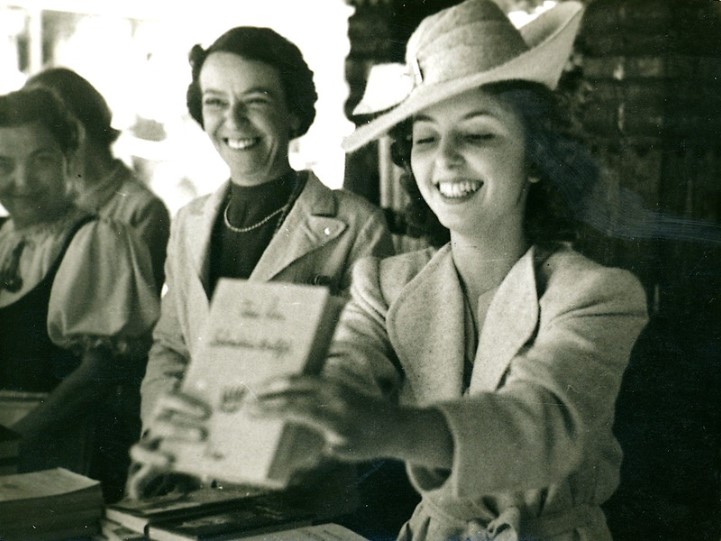

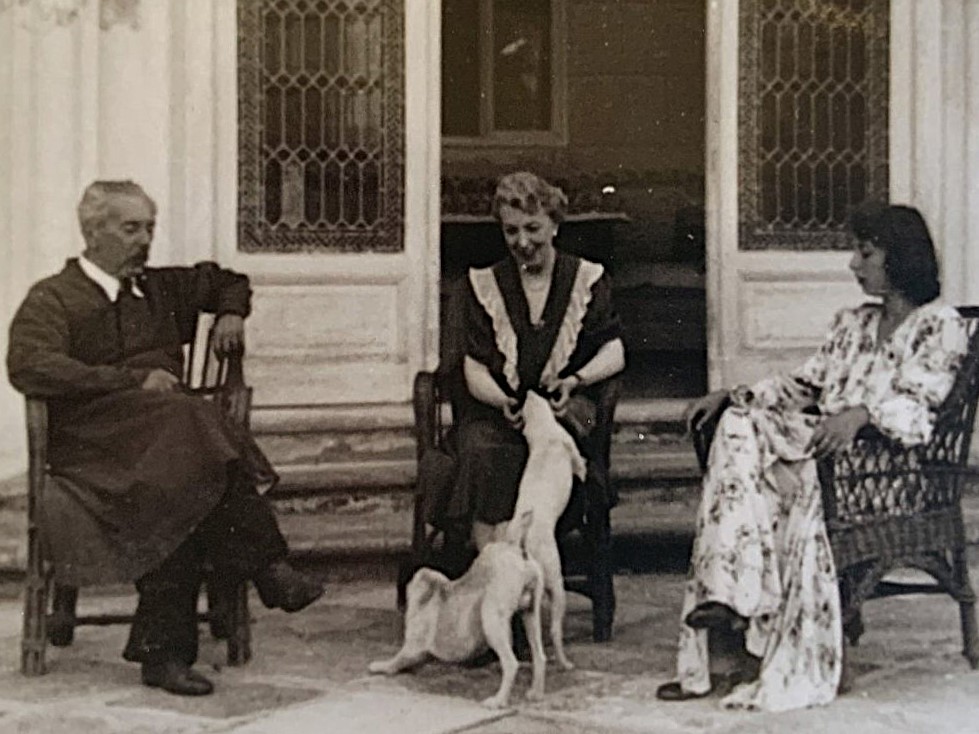
Articles of Note: 11 November 2024

Caro had been a Nieman Fellow at Harvard studying urban planning and land use when he came up with the idea for the book. He thought it would take him nine months, but extensive research and over five-hundred in-person interviews meant it took eight years to complete.
Caro then started working on his study of Lyndon Baines Johnson, the first volume of which emerged in 1982 and the fifth (and final?) one he is still working on. (At the end of the fourth, LBJ had just become president.)
But where does he write? Christopher Bonanos of New York magazine finds out:
It’s an ageless space, one where it could be last week or 1950 inside, matter-of-fact and utilitarian. A couple of bookcases, a plywood work surface, corkboard with outlines tacked up, an old brass lamp, an underworked laptop for emails, a Smith-Corona typewriter. The desk chair is hard wood with no cushion. There’s a saltshaker next to the pencil cup for when Ina brings a sandwich out at midday. The desk has a big half-moon cutout, same as the one back in New York, so he can rest his weight on his forearms and ease his bad back. That arrangement was recommended by Janet Travell, the doctor who grew famous for prescribing John F. Kennedy his Boston rocker. She, with Ina, is a dedicatee of The Power Broker.
He bought the prefab shack, he says, from a place in Riverhead for $2,300, after a contractor quoted him a comically overstuffed Hamptons price to build one. “Thirty years, and it’s never leaked,” he says. This particular shed was a floor sample, bought because he wanted it delivered right away. The business’s owner demurred. “So I said the following thing, which is always the magic words with people who work: ‘I can’t lose the days.’ She gets up, sort of pads back around the corner, and I hear her calling someone … and she comes back and she says, ‘You can have it tomorrow.’”
Does he write out here every day? “Pretty much every day.” Weekends too? “Yeah.” Does he go out much while he’s on the East End? “We have two friends who live south of the highway, and I said to Ina, aside from them, I’m not going this year.” There are other writer friends nearby in Sag Harbor, and they get together, but at this age, Caro admits a little sadly, they’re thinning out. He’ll be 89 this fall.
■ George Grant is a still-underappreciated giant of political thinking in the English-speaking world. He is too little known outside his native Canada, which he sought to defend from the undue overwhelming influence of its sparkling and glamourous southern neighbour. Next year marks the sixtieth anniversary of his Lament for a Nation.
Of all people, a research fellow at Communist China’s Institute for the Marxist Study of Religion — George Dunn — has written a thoughtful introductory overview of Grant’s life and thinking: George Grant and Conservative Social Democracy in Compact.
■ Katja Hoyer mused on an overlapping theme in a recent Berliner Zeitung column which she has helpfully presented in English as well:
A diplomat close to the SPD recently told me that he couldn’t understand why working-class people in particular voted for the AfD. Things weren’t so bad for them, after all. I didn’t bother pointing out that rampant inflation, high energy prices and rising rents have had a hugely detrimental effect on the living standards of people with low and middle incomes because his analysis completely misses the point.
Germany’s working-class voters, Katja argues, feel forgotten by the parties founded to represent them.
■ Since the fall of the Berlin Wall — and earlier in Angledom — political conservatism has effectively been taken over by economic liberalism.
This has denied the centre-right from learning from and deploying useful experience from outside liberalism, with the wisdom of figures as varied as Benjamin Disraeli, Giorgio La Pira, Charles de Gaulle, and Thomas Playford essentially ignored or sidelined.
Kit Kowol’s new book Blue Jerusalem: British Conservatism, Winston Churchill, and the Second World War explores the visionary side of wartime Conservatism. Dr Francis Young offers his take on Tory utopias in The Critic.
■ From a similar era, Andrew Ehrhardt writes at Engelsberg Ideas on Ernest Bevin and the moral-spiritual dimension of British foreign policy.
■ Our friend Samuel Rubinstein has studied at Oxford, Leiden, and the Sorbonne — technically the oldest universities in their three respective countries (although we all know that Leuven is in fact the doyen of Netherlandish academies).
Sam offers an incredibly interesting comparison of the experiences of these three institutions in a humble essay on his Odyssean education:
I arrived in Leiden, armed with my phrase-book, with some ambitions of learning Dutch. The first blow came at the Starbucks in the train station, when the barista answered my Ik wil graag in English without hesitating. The second came the following day when I tried again, at a different café – only this time it seemed that the barista (Spanish? Italian?) didn’t know much Dutch either: even the natives were placing their orders in English. So I gave up – save one hobby, reading Huizinga in the original. I got myself an attractive coffee-table edition of Herfsttij and managed a page or so a day, strenuously piecing it together from my English, German, and smattering of Old English. I still haven’t the faintest idea how to pronounce any of it.
■ And finally, those of us who love Transylvania will enjoy Toby Guise’s summary of the Fifth Transylvanian Book Festival in The New Criterion.
Why do you read?
We were both attending one of those formal dinners that punctuate the terms of the year so, as I was going to see him anyhow, I gave in.
With his kind permission, it is reproduced here:
I truly have no idea. I’ve never stopped to think about it. It’s probably a compulsion of some kind. I’ve always been a firm believer that some things you must stop yourself every now and then and analyse and there are other things you should never question and just accept. Reading falls in the latter category.
You’re a very social person though.
So I’m told.
And you live in London – a very social place. Is it difficult to get reading in then?
Yes and no. You need to force yourself to read before bed. It’s important to always have a book on the go. If you’re in London you’ve got tube journeys or the bus or whatever as you get from A to B. You have to maximise that time. Put it to use.
That’s why all books should be available in handy paperback editions that can fit in your coat pocket. This is much easier in winter when you’ve got a coat. In summer – also an excellent reading season in many ways – I don’t like feeling encumbered. I don’t like to carry things around. So unless it’s an old Penguin size – the perfect size – that I can slip into my back pocket then I tend not to read on the go.
You’re very passionate about book design and production.
I’m very correct about book design. It is unfathomable how incredibly and completely wrong the entire publishing sector in the English-speaking world is. I know the grass is always greener, but I’ve pointed out again and again how much better it is in France and also Germany a bit. Germany for the classics they have those excellent Reclam editions – Universal-Bibliothek – that are so useful. They are dirt cheap, small size, the easiest thing in the world to purchase, read, use, carry around. Insanely practical.
In backwards Angledom meanwhile every new book comes out in clunky hardback first and you have to wait a year or sometimes longer before you can get it in a form human beings can use. Why? Okay, maybe someone likes sitting in an armchair in their “study” smoking a pipe and reading a hardback book — D. W-B in Edinburgh, I imagine. Good for them. Do you really think that’s most people? I don’t have a commute – I have a fifteen-minute walk to work – but who wants to lug a massive hardcover on a train or a tube? Ridiculous.
But you’ve…
Another thing! It’s also perfect proof of the lies that the liberal capitalists would have us believe. They contend that if there’s a market for something it will just magically appear and the need will be fulfilled. Balderdash of the highest order. Culture exists. And publishing culture in the English-speaking world ordains you must publish the clunky cumbersome version first and then wait to issue a paperback version. Oh and when the paperback edition comes out it’s also too big in size. If ever I wield supreme dictatorial power you better believe I’d be forcing a return to the old Penguin size. Penguin don’t even use it anymore. Idiots.
But you’ve said you don’t read living writers so I guess you’re not buying newly published books anyway.
Okay, yes, maybe. Everyone knows to be a writer worth reading you’ve got to be dead. Turns out this isn’t exactly true. There are actually a good number writers scribbling away today who are perfectly worth reading, even if maybe they’re not high literature and they won’t end up in the Pantheon. Middle-brow – even popular novels – can be extremely enjoyable and worthwhile. They use up a different part of your brain. But they can be exceedingly clever. Just look at detective fiction. Agatha Christie. Insane talent, deployed in a very specific fashion. Not Shakespeare, not Racine…
Racine was a dramaturge, not a novelist.
Ooooh! Look at you! “Dramaturge”. You mean a playwright, a dramatist. “Dramaturge.” I mean really… Racine was a writer, tout court. You know what I mean. Incidentally I bought some French drama recently. Molière.
You’ve been involved in some French drama recently.
In a manner of speaking… [Several sentences of this interview redacted from public display to protect the guilty.]
…But I’ve got Molière on my pile for this winter.
Do you read a lot of French writers?
Hmm… No… Maybe? No, I don’t think so. I try and keep abreast of things. I probably read more Arabs at the moment. Right now I’m in the middle of Amara Lakhous: Clash of Civilizations Over an Elevator in Pizza Vittorio. So far it’s very clever, very human. But Lakhous is an Arab in Europe. Or is he in New York now these days? But he was in Italy for years and writes in Italian sometimes and in Arabic.
Majdalani. Charif Majdalani: he’s a proper Arab writer. Lives in Beirut.
He used to work in France though.
Okay, okay, yes. But he’s a proper Lebanese writer, alive too. I think he’s teaching at Saint-Joseph. I have him on my pile at home but I haven’t read him yet.
A little lighter – well, not in subject matter – but I’d like to read Yasmina Khadra, the pseudonym of the Algerian detective writer Moulessehoul.
Khadra lives in France, too.
Okay! Yes! I get it! Maybe you’d live in France too if you were an ex-army officer who criticised Bouteflika. Anyhow. His police novels, they’re Algiers. Gritty. I need to read them.
Lakhous is clever though – I hope not too clever. A little whimsical. It’s the world of the non-European in Europe. Chika Unigwe writing the experience of Nigerians abroad. Her writing has a very basic primalness to it.
But the non-Euro experience of Europe: Maybe there’s not enough of that – or maybe there is but it’s done by crap writers who are praised just for their backgrounds. Turns out there’s no need because there are actually good writers doing things.
But there’s plenty of rubbish. In general.
Oh ho ho – so much rubbish. But you can just ignore that. Never get distracted by it. Life’s too short.
You’ve often said that people need to curate their attention span.
Yes! Yes! A thousand times yes! There’s so much beauty in the world, whether in real life or in art and writing and plays and everything. You will be so much better off if you just ignore the crap. It’s not worth your attention. It sure as hell ain’t worth mine.
Who else of the Arabs?
Alaa al Aswany – is he any good?
I haven’t read him. You live in London: how do you keep up with Arab writers?
Oh you just do, somehow. Via French for one thing. Keep your eyes on Le Figaro littéraire. They’re in there a lot and then you have to see if they’ve been translated into English. Often you find the author but not the latest as they’re either written in French or translated into it pretty quickly. But you hear about a writer and you see what’s been translated into English. And obviously L’Orient littéraire is superb for trying to get to know the ecosystem of Arab writers. And Arablit Quarterly.
Do you read novels in French?
No – my French is actually terrible. I’m good at reading things like newspapers and non-fiction in French. Probably misunderstanding half of it, but good enough. I cannot read fiction in French, not good enough. Or maybe I just don’t try.
At a sort-of conference the other day, Adrian Pabst — what a gent he is — he introduced me to some visitors as a “fellow francophone”. Generous — I had to correct him. Anyhow, I need to learn French better. Tout le monde civilisé parle, lit et pense en français.
Est-ce que tu es civilisé ?
Ah! Nous – les celtes, les anglais, whatever – on est un peu des barbares. But the light of civilisation has fallen upon us as well. Celts in particular – I think we like to do things with words. We can deploy them in amazing subterfuges.
And then there’s Stoppard.
Stoppard: the nexus of Jewry, Mitteleuropa, and the English language.
Precisement. I know he’s a show-off. Everyone always says he’s a show-off. But come on, he’s amazing.
By the way, this is my first year where I will have in one calendar year seen three different Stoppard productions. ‘The Real Thing’ at the Old Vic – that was brilliant, just ended – and earlier ‘Rock ’n’ Roll’ at the Hampstead Theatre. Nathaniel Parker, excellent on stage.
I love going to the Hampstead Theatre because the congregation is very Jewish and it makes me feel at home.
New York.
Exactly. And then next month there’s something at… well I don’t know which theatre. Or which play.
The Invention of Love?
Yes! The Invention of Love.
That’s also the Hampstead Theatre.
Perfect. I think the first Stoppard I saw was there. They’re into him. I think he’s into them, too.
What about history though? What history are you reading?
You know, the American colonial period and the early republic have produced so much historical writing. A lot of it is very good. Okay, a lot of it is crap, too. There’s far too much pious nonsense – all that Founding Father worship, it’s excessively tiresome. Jefferson? Nein danke! Did you see they took the statue of Jefferson out of [New York’s] City Hall? Yeah they did it for the wrong reasons but – why was he there to begin with?
He’s Virginian.
He’s Virginian! And not one of the good ones! But there are so many interesting characters and amazingly accomplished people. I find George Washington boring but there are so many fascinating people from this time. You just have to avoid the pious stuff that a certain kind of respectable established American writer type can write about them.
There’s that wonderful institute at William & Mary.
I thought you were anti-Virginian.
I’m pro William & Mary. The college, that is – definitely not the monarchs. Anyhow, they have this institute for early American history and it publishes excellent historical stuff. Has done for decades. They have a quarterly journal.
Favourite Virginian writer?
Poe. Am I allowed to say Poe? Was he a Marylander?
He was born in Boston.
We won’t hold that against him. Baltimore claims him. No one associates him with Boston. I think his formative years were in Virginia. He was kicked out of West Point. And we also have Poe Cottage in New York.
Is Poe a good writer for Hallowe’en?
Oh of course. Reading is very seasonal, isn’t it? I only got into that horror stuff – what do you call it? Gothic, I guess. I only started enjoying that a few years ago. We read Poe at school, of course. But a few years ago, one winter’s evening — I was at a dinner at Boodle’s and sitting next to a princess…
Finally, the name dropping. I was warned it would come.
Just for that I won’t say which. Well she started going on about M.R. James and how brilliant he was and his stories and the settings and everything, so I got into M.R. James. And I read all his short stories. Or maybe they were just the Penguin selected ones? Anyhow, I told this to my friend – my best friend, in fact – and he said he’d recommended M.R. James to me years ago and I did nothing about it. Oh well. Sometimes you need someone to tell you things in the right setting, the soft candlelight, the gentle murmur of a table full of people in a hall… Robertson Davies! His ghost stories as well. He was made head of Massey College at Toronto — basically the All Souls of Toronto — and would write a new ghost story every year to be read aloud after some annual dinner in hall.
Speaking of which, I believe we’re being called in to dinner.
Procedamus.
Thank you.
Thank you.
Christmas Book List 2022
A reading list for the festive season
Instead, I will give an actual Christmas book list — namely, a list of books I intend to read this Christmas, snuggled up in whatsoever sufficient level of coziness I manage to achieve.
If you want to read a partial selection of books I’ve already finished reading, there is a Twitter thread you can consult (though, naturally, it doesn’t list everything).
But here are the eight books I’m looking forward to devouring.
Thomas Pink is now Emeritus Professor of Philosophy at King’s College London but he is no less busy since he has several volumes either to write or to edit on his to-do list. As a natural polymath with many interests, Tom is one of the best book-recommenders I have the privilege of knowing.
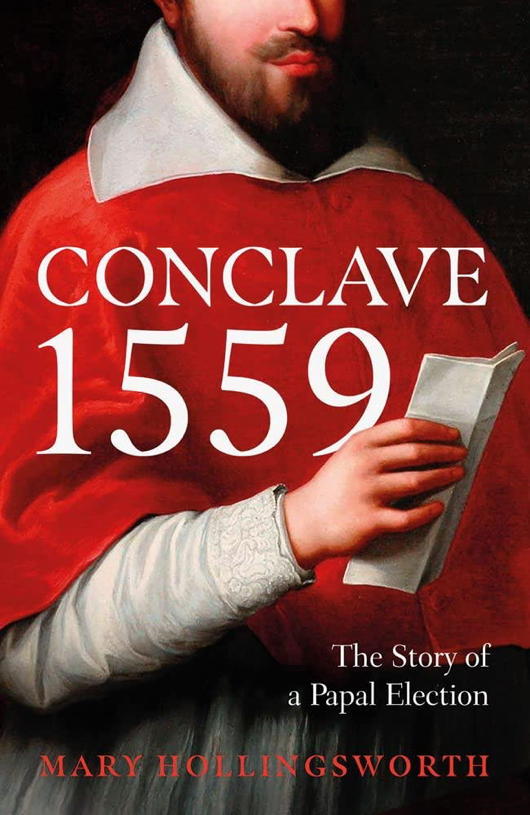 Last time we had a drink he put forward Mary Hollingsworth’s Conclave 1559: Ippolito d’Este and the Papal Election of 1559. It’s the only one on my Christmas reading list I’ve already jumped right into, and it’s excellent so far.
Last time we had a drink he put forward Mary Hollingsworth’s Conclave 1559: Ippolito d’Este and the Papal Election of 1559. It’s the only one on my Christmas reading list I’ve already jumped right into, and it’s excellent so far.
This is a period of European (and world) history I’ve not devoted any great study to, so Hollingsworth’s accounts almost attains the level of a political thriller. She’s skilled at combining archival research with an eye for the enlightening detail, which makes Conclave 1559 an enjoyable read.
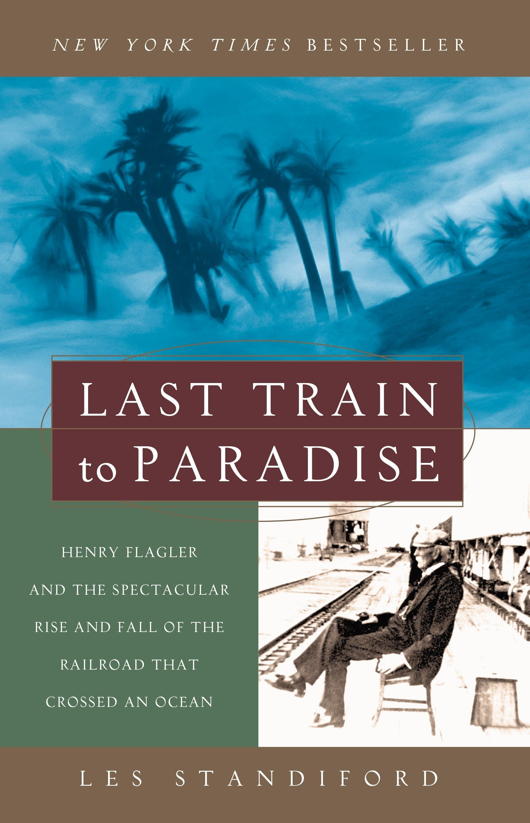 Another history on my list is Last Train to Paradise: Henry Flagler and the Spectacular Rise and Fall of the Railroad That Crossed an Ocean by Les Standiford. As a child visiting the colonial city of St Augustine in Florida I remember seeing some of the extraordinary Spanish revival buildings Henry Flagler erected as part of his rail-and-hotel conglomerate.
Another history on my list is Last Train to Paradise: Henry Flagler and the Spectacular Rise and Fall of the Railroad That Crossed an Ocean by Les Standiford. As a child visiting the colonial city of St Augustine in Florida I remember seeing some of the extraordinary Spanish revival buildings Henry Flagler erected as part of his rail-and-hotel conglomerate.
Florida as we know it today was practically invented over a century ago when Flagler built his Florida East Coast Railway to bring northerners down to the Sunshine State. From 1905 to 1912 he managed a feat of engineering by extending the line across the Florida Keys.
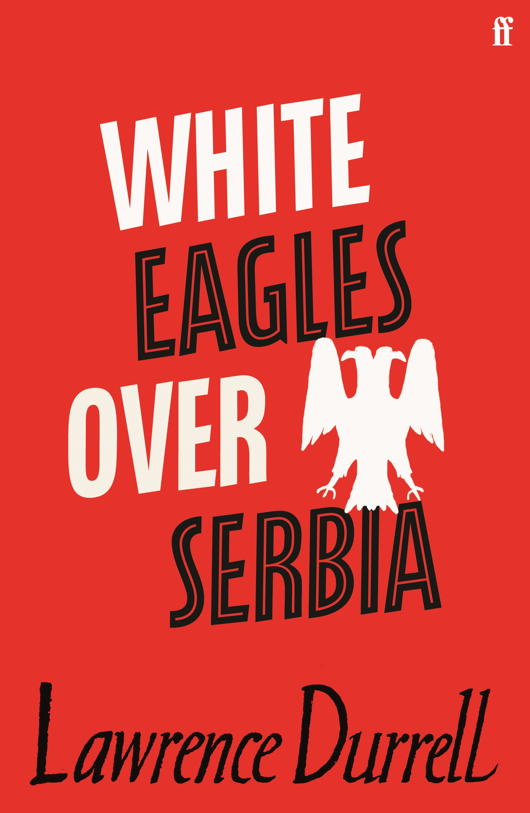 Lawrence Durrell, despite never being a UK citizen thanks to quirks of Indian birth and bureaucracy, spent a few spells of his life working for the British diplomatic service. He’s most famous for his ‘Alexandria Quartet’, but it is White Eagles Over Serbia — a tale of a British agent caught between communists and royalists in post-war Yugoslavia — that has made it to my festal reading list.
Lawrence Durrell, despite never being a UK citizen thanks to quirks of Indian birth and bureaucracy, spent a few spells of his life working for the British diplomatic service. He’s most famous for his ‘Alexandria Quartet’, but it is White Eagles Over Serbia — a tale of a British agent caught between communists and royalists in post-war Yugoslavia — that has made it to my festal reading list.
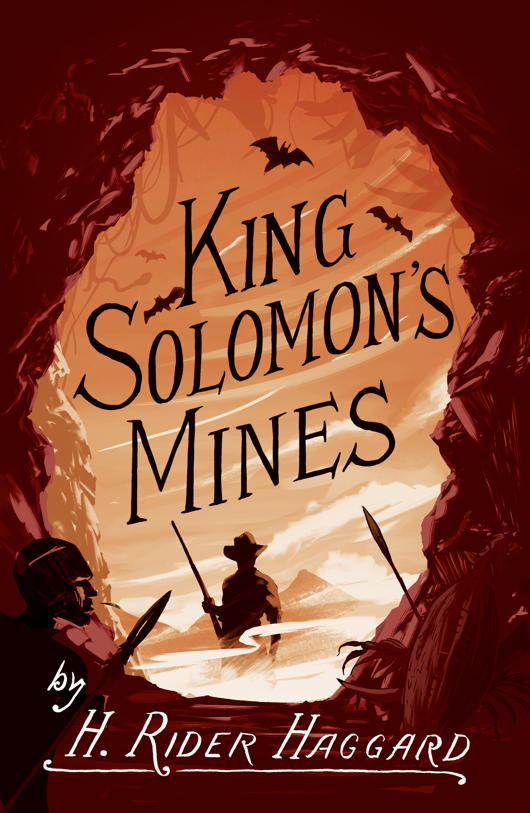 Exotic tales of derring-do were the stock in trade of Sir H. Rider Haggard, but I have to admit I’ve never read anything by this popular Victorian/Edwardian writer.
Exotic tales of derring-do were the stock in trade of Sir H. Rider Haggard, but I have to admit I’ve never read anything by this popular Victorian/Edwardian writer.
Rectifying this error, King Solomon’s Mines is on my Christmas pile (though I was tempted by She as well).
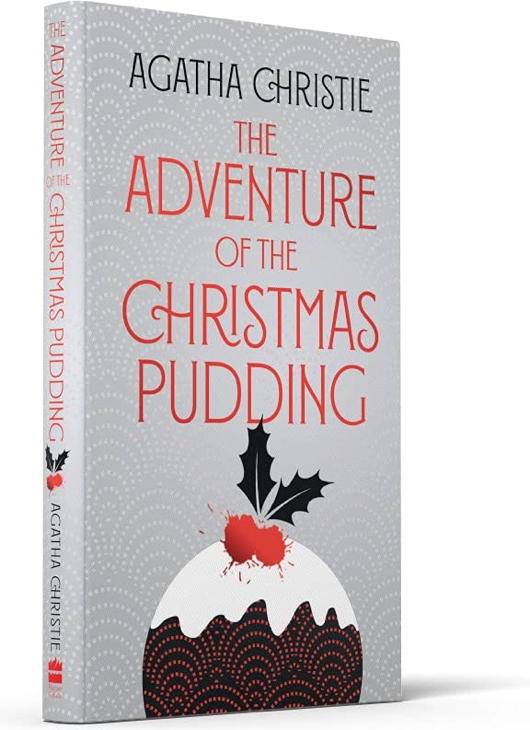 I love a good detective novel, and the undoubted Queen of Mystery is Dame Agatha Christie. The Adventure of the Christmas Pudding is a collection of short stories including both Miss Marple and Hercules Poirot.
I love a good detective novel, and the undoubted Queen of Mystery is Dame Agatha Christie. The Adventure of the Christmas Pudding is a collection of short stories including both Miss Marple and Hercules Poirot.
In case I don’t get my fill of ze little grey cells I’ve grabbed a copy of Hercule Poirot’s Christmas as well.
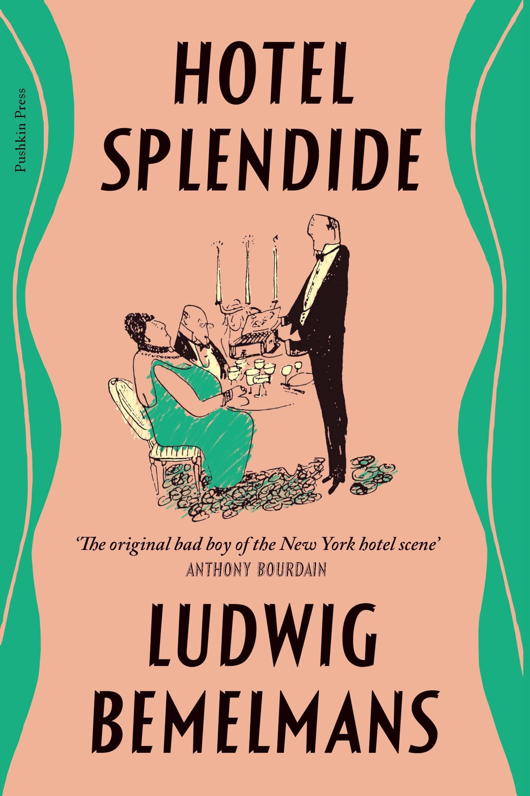 A trip back to my Heimat of New York is provided by Ludwig Bemelmans’ Hotel Splendide. More famous for creating the Madeleine series of children’s books, Bemelmans immigrated to America before the First World War, volunteered for the U.S. Army, and worked at several hotels and restaurants. These latter experiences resulted in this comic novel about life behind the scenes in a swish Manhattan hotel.
A trip back to my Heimat of New York is provided by Ludwig Bemelmans’ Hotel Splendide. More famous for creating the Madeleine series of children’s books, Bemelmans immigrated to America before the First World War, volunteered for the U.S. Army, and worked at several hotels and restaurants. These latter experiences resulted in this comic novel about life behind the scenes in a swish Manhattan hotel.
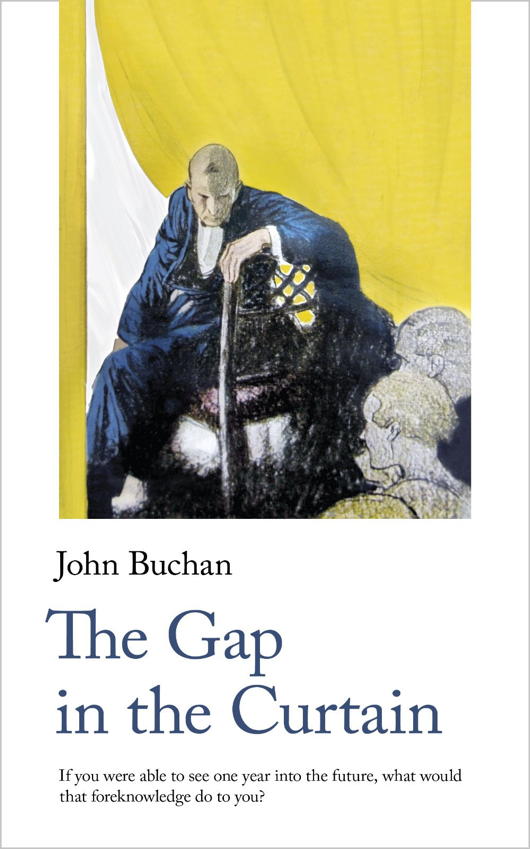 Having been previously introduced to the character of Sir Edward Leithen, I thought it might be worth catching up with him in John Buchan’s The Gap in the Curtain.
Having been previously introduced to the character of Sir Edward Leithen, I thought it might be worth catching up with him in John Buchan’s The Gap in the Curtain.
The Scots barrister and Tory MP is introduced to a brilliant physicist and mathematician who explains his theory on the workings of time and the cryptic ability to see into the future. Buchan is a reliable storyteller with admirable instincts, though this series of stories veers into the realms of science fiction.
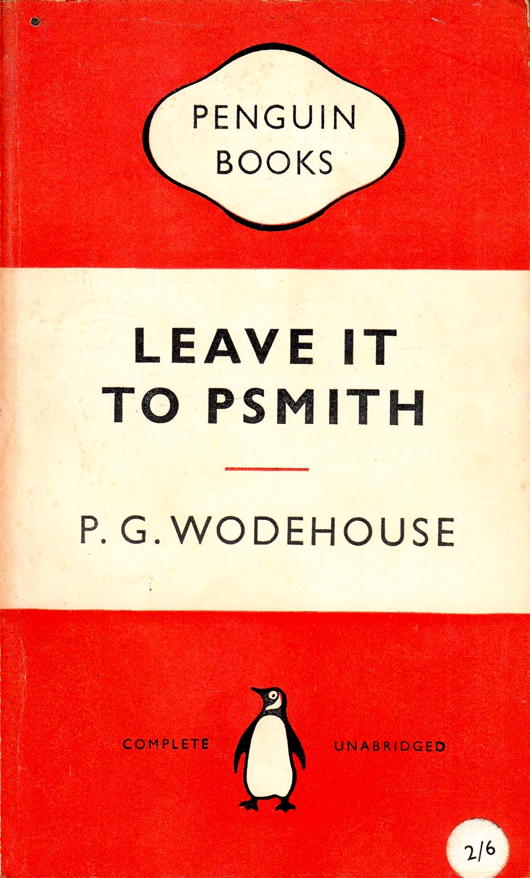 But Christmas is a light-hearted time, and so my Christmas reading list finishes with a visit to Blandings Castle thanks to Sir Pelham Grenville Wodehouse’s Leave it to Psmith.
But Christmas is a light-hearted time, and so my Christmas reading list finishes with a visit to Blandings Castle thanks to Sir Pelham Grenville Wodehouse’s Leave it to Psmith.
The ‘p’, of course, is silent — “like in ‘pshrimp’”.
Mistranslating Apostates
ONE OF THE historical anecdotes I enjoyed being taught at school was the death of the Emperor Julian the Apostate — as relayed by our much-esteemed teacher Dr Nathaniel Kernell. This was in the Christian era with the capital at Constantinople rather than the Eternal City itself — Julian had (as betokened by his moniker) abandoned Christianity aged 20 and sought to frustrate its spread.
He wanted to promote the old Greek gods, dabbled in vegetarianism, and even tried to rebuild the Temple of Jerusalem. Mysterious fires consumed the workers tasked with that final project and it is presumed many Jews didn’t want to be dragged into the Emperor’s political project the animus of which was opposition to Christianity rather than promotion of Judaism.
Anyhow, none of Julian’s projects came to much fruition and as he lay dying from an injury in battle, the apostate emperor realised the futility of his life’s work with his final words: νενίκηκάς με, Γαλιλαῖε, or ‘Thou hast defeated me, Galilean!’
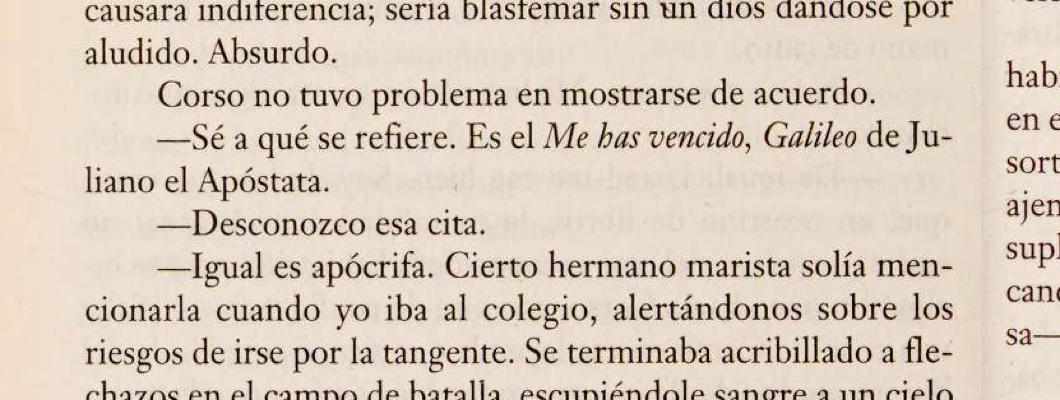
At the moment I am reading a book by Arturo Pérez-Reverte and stumbled across a mistranslation from the Spanish that would have been avoided if only the translator had enjoyed the privilege of being taught by Dr Kernell.
It turns out that the Spanish word for ‘Galilean’ is ‘Galileo’. Pérez-Reverte’s translator, alas, failed to understand one of the characters reference to Julian’s final words and mistook Christ our Saviour for an Italian astronomer, mistranslating the phrase as “You have defeated me, Galileo”.
Worth a wry smile, given the solid 1,200-year gap between the death of Julian the Apostate and the birth of Galileo Galilei.
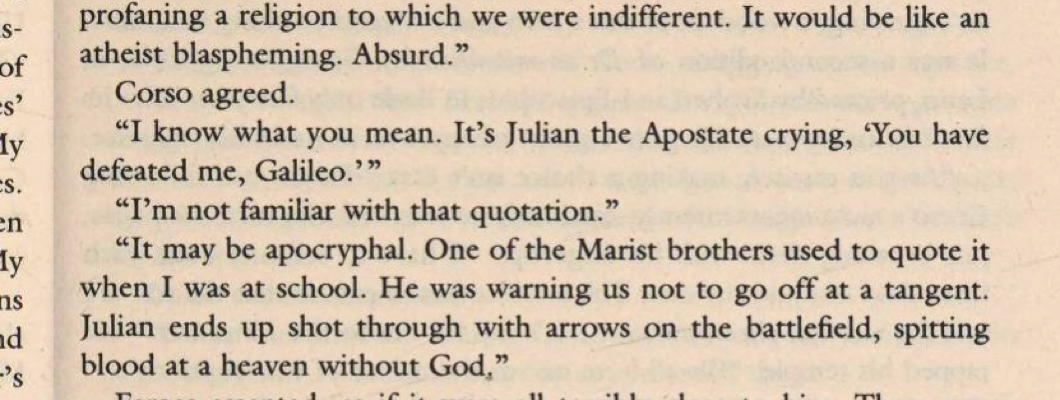
The Dumas Club is a delightfully weird and intriguing tale, though, and I look forward to reading more by Pérez-Reverte — no matter who the translator is.
Anglo-Gaullist Reading Update
The latest round of news or commentary of Gaullist content or interest:
Mercator: Charles de Gaulle: a wise ruler of France
Financial Times: France invokes the golden age of de Gaulle
Politico: Why all French politicians are Gaullists
Variety: Cliché-Ridden ‘De Gaulle’ is Unworthy of Its Iconic Subject
Articles of Note: 3.II.2022

“Lebanese money was worth more and there was more to eat when militias were fighting each other in the streets of Beirut 40 years ago than there is today.”
One of the great ironies of Lebanon’s current decline (Fernandez points out) is that, as destructive as the Civil War was, the country’s hopes were finally crushed by bankers and politicians rather than warlords.
— A bumper from The European Conservative: Tim Stanley says “Stay away from politics!” (I couldn’t agree less: we need brighter people involved!)
■ Idealists in Europe refusing to bow to reality have provided false hope to countries that have no real prospect of becoming members of NATO or the EU.
Damir Marusic muses on the Ukraine in How Not to Bend the Arc of History.
■ I ran into my friend João at a dinner party last night and he described the very existence of Brazil as “the greatest thing Portugal ever did”.
In 2018, Americas Quarterly claimed the now-deceased Olavo de Carvalho was the most important voice in Brazil’s then-incoming government (even though he didn’t live there).
More bizarrely fascinating is Nick Burns’s 2019 article on Bruno Tolentino, Carvalho, Ernesto Araújo, and the origins of the new Brazilian right.
Brazil’s foreign minister “penned an eyebrow-raising article for Bloomberg in which he blamed Ludwig Wittgenstein for Brazil’s debility on the world stage”.
If you’ve never lived in Latin America (I claim to have been at least partly educated there) you will never really understand quite how different it is.
■ When Algeria became independent, President Ben Bella had spent so long in French prisons that he had almost forgotten his Arabic.
One million French Algerians left within months, as American diplomats in Paris and Algiers at the time recall.
French Algerians “not only controlled the whole private sector, they had all the top government positions, and more importantly, they filled all the minor positions. The guy who read the gas meter in the utility company was a Frenchman. The women who worked the switchboard in the telephone company were all French. So the economy just came to a screeching halt.”
— Ex Africa semper aliquid novi: A new documentary (watchable online) explores Algeria under Vichy while another looks at Jacques Foccart, de Gaulle’s “Mister Africa”.
■ I am not much of a “Substack” aficionado, but I have recently given in and signed up to receive The Postliberal Order in my inbox. It’s penned by the quadrivirate of Vermeule, Deneen, Pappin, and Pecknold — all of whom have become household names in Cusackistan.
Patrick Deneen’s latest contribution on emerging postliberalism amidst the political persuasions of his students is worth a read.
Fifth Republic Britain
An Anglo-Gaullist Reading Round-up
While I’m a big Adenauer fan there’s little doubt that de Gaulle was the greatest European statesman of the twentieth century and an historical figure of such a position will always be the subject of interest.
Both Jonathan Fenby’s 2010 book The General: Charles de Gaulle and the France He Saved and Dr Sudhir Hazareesingh’s 2012 In the Shadow of the General: Modern France and the Myth of de Gaulle received wide notice, but neither as much as Julian Jackson’s 2019 A Certain Idea of France: The Life of Charles de Gaulle.
Jackson’s work is indeed magisterial and Lord Sumption’s praise of it as “the best biography of de Gaulle in any language” is only just an exaggeration. (For a strong bibliography of works on the general, see the appendix of Charles Williams’s 1993 The Last Great Frenchman: A Life of General de Gaulle.)
Study of the life and contradictions of de Gaulle is always worthwhile, but many spy a Gaullist moment in the Tory party’s refreshingly surprising turn away from ideological liberalism towards a more pragmatic conservatism under Boris Johnson.
Painting Johnson as Britain’s first Gaullist prime minister would be a stretch, but there is certainly some crossover: nationalist, economically interventionist, focused on national sovereignty and national exceptionalism.
■ Eliot Wilson pointed out this summer that Boris has always been difficult to classify in ideological terms.
■ Speccie political editor James Forsyth wrote in The Times that Boris the Gaullist puts action over ideas. Just before the party conference Forsyth also predicted the PM’s speech would be “in line with his recent Gaullist turn”.
■ QMUL’s Nick Barlow explores the parallels between de Gaulle’s Fifth Republic and Boris’s style of government.
■ Meanwhile Aris Roussinos argues that de Gaulle was always right in vetoing British entry into the EEC, and that true-blue FBPE types should welcome Brexit as advancing the cause of European integration.
■ Dean Godson (New Statesman) says that Defence Secretary Ben Wallace is pursuing “almost Gaullist trajectory for future British policy”.
■ When asked (on GB News) where he sits on the political spectrum, national treasure Peter Hitchens expressed his surprise that the Gaullist combination of “strong defence, patriotism, a strong welfare state, and national independence” isn’t more common in British politics.
■ ‘Bagehot’, the political column in The Economist, put it that the man who rebuilt post-war France has some important lessons for Britain’s prime minister: What Boris could learn from de Gaulle.
■ The American Conservative embarrassingly illustrated a piece on Europe’s Gaullist Revival with a picture of General Kœnig. (Always check the képi — as a brigadier general, de Gaulle only had two stars!)
■ Mike Bird discerned some Anglo-Gaullism in a pile of recent newspaper headlines.
■ As long ago as 2017 — what a world away that was! — Prospect argued in a somewhat rambling piece that the Brexiteers were Britain’s new Gaullists.
■ Honourable mention: Frederick Studemann chides Churchill and dumps de Gaulle, saying Boris should model himself on Bismarck and make for a Prussian Brexit.
But, for all this, when New Labour bigwig John McTernan suggested that Boris is not a Churchill but a de Gaulle, the great Julian Jackson himself pointed out there are still great differences between the PM and le général.
All the same, I’m welcoming our Anglo-Gaullist future with open arms.

Articles of Note: 24.II.2021

• It is almost certain that we will never know who the actual winner of the 2020 presidential election was: the methods of fraud which might have been deployed are by their very nature ephemeral. Anton is right in that the best summary of the irregularities is from the U.S.-based Swedish academic Claes Ryn: How the 2020 Election Could Have Been Stolen. Ryn’s academic work is always an insightful read so his take here is worthwhile.
• I’ve said it before and I’ll say it again: the Frenchman Pascal-Emmanuel Gobry is always worth reading and always brings something to the table. P.E.G. argues the pre-Trumpers, anti-Trumpers, and never-Trumpers on the American centre-right need to recognise the reasons why Trump became a political phenomenon in the first place: Why Establishment Conservatives Still Miss the Point of Trump.
• One of the best books on urbanism in the Cusackian library is Allan Jacobs’s Great Streets. The expert work with its illustrative maps, diagrams, and line drawings is now a quarter-century old and on this anniversary Theo Mackey Pollack examines What Makes a Great Street.
• A new book argues that our vision of Northern Ireland as a corrupt and gerrymandered statelet from its birth in 1921 until the imposition of direct rule in 1972 is largely a myth. The editors Patrick J Roche and Brian Barton take to the pages of the once-great Irish Times to offer A Unionist History of Northern Ireland. It’s… an interesting perspective that will doubtless provoke a debate, but colour me sceptical.
Articles of Note: 15.I.2021

• Autumn and winter are a time for ghouls and ghosts and eery tales. At Boodle’s for dinner two or three years ago I sat next to the wife of a friend and exchanged favourite writers. I gave her the ‘Transylvanian Tolstoy’ Miklos Banffy, in exchange for which she introduced me to the English writer M.R. James — whose work I’ve immensely enjoyed diving into. The inestimable Niall Gooch writes about Christmas, Ghosts, and M.R. James, as well as pointing to Aris Roussinos on how Britons’ love for ghostly tales is a sign of (little-c) conservatism.
• There can be few figures in English history more ridiculous than Sir Oswald Mosley. But the Conservative MP who became a Labour government minister and then British fascist führer-in-waiting was also forceful in his condemnation of the savagery unleashed by the Black-and-Tans. In 1952 a local newspaper in Ireland announced that Sir Oswald and Lady Mosley “charmed with Ireland, its people, the tempo of its life, and its scenery” had taken up residence at Clonfert Palace in Co. Galway. “Sir Oswald,” the paper noted with amazing restraint, “was the former leader of a political movement in England.” Maurice Walsh presents us with the history of Mosley in Ireland.
• The death of the late Lord Sacks, Britain’s former Chief Rabbi, was the subject of much lament. Rabbi Sacks was obviously no Catholic, but his intellect, frankness, and generosity were much appreciated by Christians. Sohrab Ahmari, one of the editors at New York’s most ancient and venerable daily newspaper, offers a Catholic tribute to Jonathan Sacks.
• “Education, Education, Education” has become a mantra in the past quarter-century and while there is a point there’s also a certain error of mistaking the means to an end for the end itself. After all, in the 1930s Germany was the most and highest educated country in the world. At Tablet, probably America’s best Jewish magazine, Ashley K. Fernandes explores why so many doctors became Nazis.
• Fifty years ago the great people of the state of New York rejected both the Republican incumbent and a Democratic challenger to elect the third-party Conservative candidate James Buckley as the Empire State’s senator in Washington. At National Review Jack Fowler tells the gleeful story of the unique circumstances that brought about this victory for Knickerbocker Toryism and how Mr Buckley went to the Senate.
Articles of Note: 23.XI.2020

• France’s Year of de Gaulle has marked the fiftieth anniversary of his death earlier this month and what would have been the general’s one-hundred-and-thirtieth birthday yesterday. Julien Nourian has put together a Weberian analysis of the general and his charismatic mystique.
• President Trump is a very different kind of leader to de Gaulle, and his chances of continuing in the White House are not looking great at the moment. (Our head of legal in New York thinks he’s still got a chance, however.)
Regardless of who will be inaugurated in January of next year, Trump managed to win the highest proportion of minority votes of any Republican candidate since 1960 (when the GOP choice was a member of the NAACP). Meanwhile, Trump lost votes among old, white, well-to-do men.
What is the future of American political conservatism? Ben Hachten points out It’s Not Your Father’s GOP.
New England poli-sci professor Darel E. Paul explores The Future of Conservative Populism, pointing out the big increase in the Hispanic vote for Trump — especially Hispanics living in Texas along the Mexican border.
• In Britain, Ferdie Rous says the Conservative party is having difficulty reconciling the business wing of the party with our rural roots, but suggests that The writings of Lewis and Tolkien embody conservative environmentalism.
Meanwhile David Skelton asserts It was working class voters who delivered this majority – and Johnson must not abandon them now.
• Here in London we’re still in the middle of the second lockdown. Instead of following the science, governments around the world are implementing the exact opposite of effective measures to combat the pandemic. It’s The Greatest Scandal of Our Lifetime according to R.J. Quinn.
• We can always do a with a dose of Metternich and Wolfram Siemann’s 900-page doorstop has provided a chance for many to analyse the master diplomat. Ferdinand Mount examines The Prime Minister of the World.
• And finally, the Museum of Literature Ireland features an online exhibition on the American writer, speaker, reformer, and statesman Frederick Douglass’s visit to Ireland 175 years ago. (Available as Gaeilge too.)
Articles of Note: 22.XI.2019

• In Spiked, James Heartfield urges us to spurn Labour’s counsel and instead stop apologising for the past.
• Michael Brendan Dougherty in National Review wonders if Republican Missouri senator Josh Hawley might be the next Daniel Patrick Moynihan.
• Why would an Eton- and Oxford-educated man assert he ‘supports’ Aston Villa, a football team based in a slum in Birmingham, a city with which he has no connection? Theodore Dalrymple ponders David Cameron’s Big Lie at Law & Liberty.
• At the American Conservative, Rod Dreher ponders the radicalism of today’s left and whether its religious fervour to deny scientific realities like biological sex is driving Trump-hating lefties to back the Donald for president.
• And, for a decent long read, politics professor Daniel E. Burns examines how critics and defenders of liberalism often argue past one another:
It refers, on the one hand, to a set of political practices, and on the other hand, to a political theory that purports to explain those practices. Defenders of liberalism are thinking first and foremost about liberal political practice, which they (almost all) defend by drawing selectively on liberal theory. Critics of liberalism are thinking first and foremost about liberal political theory, which they (almost all) attack by pointing selectively to liberal practice.
In National Affairs, it’s a question of Liberal Practice v. Liberal Theory.
Scribbled Notes
Does anyone talk on the phone anymore? Reading a book in which a casual conversation takes place and the main character hangs up the phone, the fact that the author reveals this hanging-up seems surprising. We didn’t need to know it took place over the phone. But it situates the exchange in a concrete reality of sorts.
I never really feel comfortable speaking on such devices, so I only ever speak to people who are far away, pretty much only my parents. Other people use them voluminously, but I only know for certain myself of very few who do. When CSG was alive (and suspicions still linger over the nature of his death), CDL would sometimes spend hours talking to him on the phone, like two old ladies who suffer too many ailments to get out and meet in person. (I’ll concede that they were in different countries.)
I find the very idea revolting. What could one possibly discuss for hours at length down a strange device it’s not even comfortable to handle? My thoughts don’t flow properly over the phone in a way they do naturally face-to-face or via the written word.
I remember Farley’s stories about when he was a correspondent in Rome and — taking no heed of time differences — his editor would phone him up and deliver long screeds which Farley would make a few accommodating noises to then gently place the phone down on his bedside table and let the man carrying on while he gently faded back into the realms of slumber.
Then again the Major sometimes phones during his lunchtime saunter and he usually has information worth sharing or complaints that are satisfying to share, imbued with doom-laden pessimism.
On the whole, then, I am not a telephone enthusiast. Their primary purpose now is of course as smart phones — incredibly useful devices which have lured us into slavery and the impossibility of living without them.
The book I am reading — the one I mentioned earlier — is The Informers by Juan Gabriel Vásquez. I had never read any Colombians — except for Nicolás Gómez Dávila, but as he spoke in aphorisms he is in another category entirely. Colombia is a mysterious realm to me, with only little snippets having ever filtered down to me. When I was a boy, for a year or two we had the daughter of a Colombian senator at our school who taught me the words to ‘La Cucaracha’ but who, out of fear, was always entirely silent on the subject of home; she point blank refused to talk about it. (There were many killings in those days, and I suppose she was abroad for her own safety.)
But the Colombians are by no means an un-literary people — far from it. As someone briefly educated in Argentina it’s sometimes difficult to concede there is any culture in the Americas outside of Argentina, but Colombia’s Gabriel García Márquez is well-known outside his home country. I suppose I will have to read him some day but I decided to start with Vásquez having read a review of one of his more recent books in the Speccie.
Much as one hates to admit that any living writer is worth reading, Vásquez is good, and just a few pages in I got in touch with my old school friend Lucas to tell him I thought he’d like it. Lucas is an Austro-Argentine-Peruvian-Estadounidense living in Guatemala so he gets it, though what he gets is hard to describe. This novel, for example, is not action-driven but primarily from the interior life, which I think is what I mean.
Ever since school days, Lucas has always had a particular genius for over-analysis that I have always criticised him for and do my best not to provoke or indulge in, though this is difficult. Tell him you love the rain. “What? Do you? Wow! But what is it about the rain you love? Is it a primeval force? Is it because we [meaning humanity] are farmers? Well I suppose you’re Irish so you have to love the rain.” (Lucas has always wanted to be Irish.) Thus, having a furiously intensive interior life himself, Lucas might enjoy a novel set primarily (though not entirely) in the interior realm.
Hippo was here the other day in between Rome and Scotland or wherever. (He’s off to Montepulciano for a few weeks, actually.) We had a jolly auld lunch at the Farmers’ Club and discovered over a cigarette and gin-and-tonic aperitif a mutual love for Balzac. Balzac got it — well, not quite, but pretty damned close enough. I am forever reading Balzac, and going on about him to Beatrice who is mostly uninterested (her late father called him “Balls-ache”) though she is perhaps the person with whom I discuss writing most often.
And so, finishing Vásques, I am continuing through Balzac, and others. I am off to the New World later this week, for not terribly long, but I am bringing Gerard Skinner’s book on Father Ignatius Spencer, Barry Hutton’s history of Lisbon, Sandy’s Corduroy Mansions (seeing as I used to live in Pimlico), Lindie Koorts’s biography of DF Malan, and one or two others in the hope of making some progress and being entertained, informed, or enlightened.
We shall see.
Recent Reads
Few things are more enjoyable then a good old-fashioned take-down, and philosopher John Gray delivers the goods with this wonderful review of the latest book by the psychologist and “popular science” writer Steven Pinker, a “feeble sermon for rattled liberals”.
Meanwhile, the inestimable Pee Eee Gee – Pascal-Emanuel Gobry – argues that France’s reigning concept of laïcité is of much more recent vintage then its proponents claims.
The 1905 law ended public subsidies for religious institutions, but instituted no legal or cultural rule against public expression of religious values. So, why are we now told differently?
My only extremely tenuous brush with celebrity is that my Irish teacher (go raibh maith agat, Áine!) happened to tutor on-set the actress who played Luna Lovegood in the Harry Potter films. Among the sort of Dublin people who manage to continually drop into conversation that they went to Trinity, there is a (further) irritating tendency to look down upon the Irish language and use disdain for it as yet another attempt to assert their fragile sense of social superiority.
It is a contemptible and false dichotomy to think that if you appreciate Georgian architecture or Henry Grattan you can’t appreciate the Irish language or Éamon de Valera. Tiresome boors will always try to sell us such dichotomies, but we will not have them.
Paltry though my attempts to learn more Irish have been, what little I’ve picked up has been extremely rewarding and given better insight into the way English in Ireland is spoken and written. (Do the experts still call it “Hiberno-English”, I wonder?) It’s been a pleasure over the past however-long to see Michael Brendan Dougherty – one of America’s most talented journos and a fellow Irish New Yorker – share his own experiences with the Irish language.
MBD’s most recent books column at National Review explores two books concerning Irish, and moves from the Gaeltacht of the mind to a book about Leopolis/Lwów/Lviv/Lemberg in Galicia. City of Lions, incidentally, is published by Pushkin Press, which has proved an almost inexhaustible source of good reads (e.g. Oliver VII).
The recent read I most enjoyed, however, is Gordon Campbell’s delightful combative romp through English translations of the Bible, Making God Speak English. The professor sheds particular light on the thriving culture of pre-Reformation translations of holy writ in the vernacular in general and the English tongue in particular, bursting numerous bubbles of Protestant mythology along the way.
Par example:
Wyclif is a seminal figure in the long road to the catastrophe of the Reformation, with its legacy of decades of wars of religion and centuries of interconfessional animosities that live on in the twenty-first century, but the idea that he was the first translator of the complete Bible into English is a myth. The Middle English Bible, as Henry Ansgar Kelly calls it in his recent reassessment, was in Professor Kelly’s authoritative view neither the work of Wyclif nor of his Lollard followers, but was rather a wholly orthodox Bible with origins in the University of Oxford. It was immensely popular, because it enabled readers and their listeners to understand the readings from the Bible that they heard at Sunday Mass.
I learnt much from Prof. Campbell’s enjoyable submission and you might too.
What You Should Read
Three recommendations and some honourable mentions
Over at ISI’s Intercollegiate Review, there’s a post by Joseph Cunningham suggesting eight publications you should be reading. In September I came up with a handful of suggestions of what blogs or websites readers ought to take note of, particularly if they exist in the Catholic/traditionalist/conservative realm so difficult to sum up in a single word or term.
Of course, most of what you should be reading is by dead people (suggestions of who I proffered herein, including some actually alive), but while Chesterton described tradition as the democracy of the dead we would be remiss to carry forth in ignorance of the living.
Publications wise, then, what is the well-read gent, or lady, reading? I’ve judged this question by what I’ve managed to persuade/force/intimidate my friends into subscribing to or buying, as well as by my own habits.
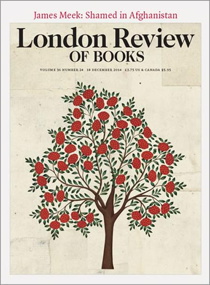
This fortnightly review is one of the last places where long-form essays are still the norm. One of the adventures of starting to read a piece in the LRB is that one has no idea whether it will continue for two of the Review’s large pages, or six, or maybe more. In addition to intellectual essays it also contains occasional reporting from Patrick Cockburn, arguably the best journalist reporting on the Middle East today. (You can read my review of Cockburn’s latest book over at Quadrapheme.)
Is it left-wing? Unquestionably. But if you’re only reading what you already agree with, you’re missing the point. Your principles should be strong enough to face challenges, or to be informed by them, and the ability to separate the wheat from the chaff is the most necessary task for any thinking person.
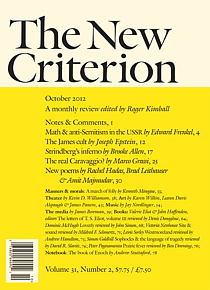
This American monthly came in for a lot of flak from a lot of conservative intellectuals for propagating and defending the neo-con support for the Iraq War, but the Daily Telegraph’s description of The New Criterion as ‘America’s leading review of the arts and intellectual life’ remains true to this day. (Disclosure: I was an editor at TNC from 2006-2008.) Feature articles are informative and expanding, the book reviews provide a good guide for reading, and art-wise I’ve always admired the clean prose of James Panero’s Gallery chronicle.
In recent months New Criterion readers have had the privilege of learning about the Jesuit linguist Albert Jamme’s hatred for sleep — “I hate my bed because it keeps me from my texts!” — and a Duke of Mantua’s expensive interest in female dwarves while last year they published the Quaker pacifist classical scholar Sarah Ruden on the darker side of Mandela’s government. Worth reading every month.
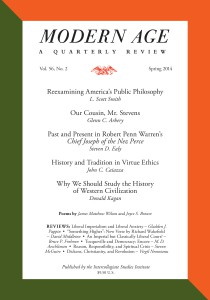
Founded in 1957 by Russell Kirk — the greatest St Andrean of the twentieth century — Modern Age is an academic journal which Wikipedia describes as ‘traditionalist, localist, against most military interventions,’ as well as critical of neo-conservatism and generally sympathetic to religious orthodoxy.
Its archive over the past sixty years provides articles and essays of great value by Erik von Kuehnelt-Leddihn, Virgil Nemoianu, Lee Congdon, Pierre Manent, and others. Take, for example, Lee Congdon on ‘Conservatism, Christianity, and the Revitalization of Europe’.
A rewarding, more scholarly read, with footnotes that will lead you elsewhere.
These three will prove worthwhile reading for any intellectual of sound principles, but are there any other honourable mentions?
My weekly workplace reads are The Spectator and The Economist which are useful for keeping tabs on things in general.
I have to admit I do read Monocle every month. While it’s aimed at wealthy jetsetters rather than our own constituency of cosmopolitan conservatives living in genteel poverty the magazine nonetheless combines an exacting stylistic excellence with an admirably broad focus.
First Things I would read every month but it doesn’t seem to be available anywhere in London except by subscription.
Two or three times a year I pick up The Art Newspaper, another superbly put-together periodical. Fr Christopher Colven of St James, Spanish Place, writes for it often, as it happens.
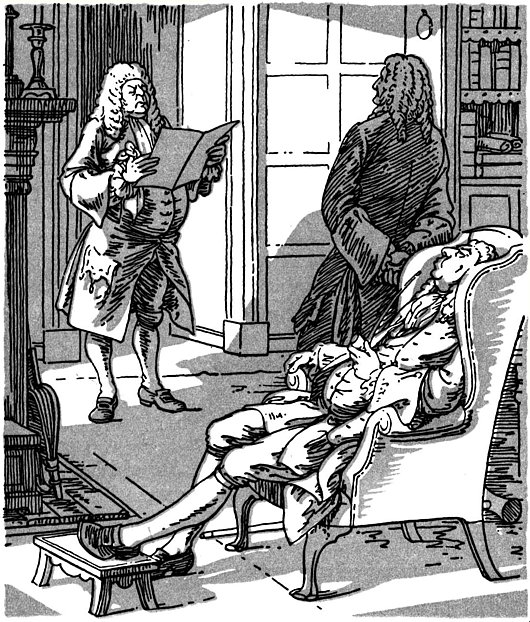
Ones to Watch (or Read)
In this commonwealth of knowledge, it is necessary to share out our sources of insight and wisdom. Here are just a few sites (“blogs”, even) that readers of this little corner of the web ought to take notes of.
Sancrucensis
http://sancrucensis.wordpress.com/
Fr Edmund Waldstein is a monk of Stift Heiligenkreuz near Vienna. He has been writing at Sancrucensis for some years now, but of course with so many distractions it often takes time to realise what is actually of value.
Fr Waldstein writes clearly and likes Charles de Koninck, so he can’t be all bad. His subject matter ranges from Saki to Žižek, and not long ago he weighed in on the Zmirak controversy.
His Amazon wish list is even larger — much, much larger — than my own, so perhaps you might think of shortening it through buying him a book.
Foolishly I neglected to visit Heiligenkreuz when I was in Vienna last year (though I did meet a chap there who wrote a history of the abbey), so I must make a pilgrimage next time I venture to the Kaiserstadt.
Opus Publicum
http://opuspublicum.wordpress.com/
This blog by Modestinus somewhat irritatingly uses the same WordPress theme as Sancrucensis, leading to occasional confusion in the Cusackian mind about who read what where. (UPDATE: It’s changed its design now.) Regardless, his ‘Weekly Reading’ updates feature selections that are very small-c catholic in taste (as well as big-C Catholic).
The names of Juan Donoso Cortes and Carl Schmitt are bandied about, and Modestinus is keen on elaborating upon Catholic Social Teaching, which seems to be getting a bit more attention all around these days.
Like Sancrucensis, Modestinus too has weighed in on our friend John Zmirak’s apostasy into liberalism. As a certain clerical personality on the outer reaches of London might put it: “Illiberal Catholicism? I’m into that!”
The Josias
http://thejosias.com/
This is not quite a blog, more of an occasionally updated resource. A multi-part series explores the American ‘Founders’ and the Aristotelian tradition, and be sure to check out ‘Have the Principles of the Right Been Discredited? Leo Strauss’s Rome and Ours’.
Worth reading also are ‘Theses against American Whig Catholicism, prompted by the atmosphere of 2012 and by the antiliberal writings of Deneen’, which De Koninck fans will enjoy.
For the Whole Christ
http://jcrao.freeshell.org/
Dr John C Rao posts a great deal of his work online at For the Whole Christ — skip to ‘Shorter pieces’ to find the more recent updates.
I am proudly in the Raovista camp, and this history professor and Catholic intellectual’s ongoing series of lectures in New York is enlivening, entertaining, and above all enlightening. Scandalously I have yet to attend the Summer Symposium in Gardone John organises every year under the auspices of the Roman Forum (it clashes with the part of the summer I am usually in the Lebanon). Some day, though, some day…
&c., &c., &c.
Of course there are the other usual places one ought to check often: The American Conservative and the much re-invigorated First Things. The Benedictus Trust (Patron: HMEH the P&GM) has been putting some of its lectures up on YouTube and Roger Scruton is headlining their Research Forum in London next year at the Linnean Society.
What have I been reading offline? Some Antal Szerb (Journey by Moonlight), some Tom Holland (In the Shadow of the Sword), and greatly enjoying some Régis Debray.
I recently forced the remnants of a dinner party I was hosting to listen to two and half pages of Voltaire-hatred from Maistre’s Soirées de Saint-Petersbourg (a sublime work!). The consistently interesting Dorchester Review featured an article on Joseph de Maistre not long ago, but it is impossible to obtain in London and I am too poor to subscribe. Perhaps I should give in and get a cheapo online-only subscription — this, after all, is what my iPad mini is for.
Some reading notes
ROBERT O’BRIEN, IN a deliberately provocative gesture, once said in conversation that he pitied America for not having any literature. Preposterous! was my natural response. We have Chaucer and Shakespeare and Mallory and Dickens! Yes, you Britons have them too, but you will have to share, I’m afraid. To try to separate America from the English greats is the equivalent of forbidding a son from taking pride in his family’s long and illustrious history. He may not be the eldest male descendant, but does this mean he must deny his heritage? Of course not. Naturally, like the Scots and the Irish we have our own subset of English literature — Mark Twain, F. Scott Fitzgerald, Flannery O’Connor, and J.D. Salinger come to mind — and there are even a few crossovers such as Henry James and T.S. Eliot.
The idea of doing a degree in English or in any literature has always seemed unattractive to me, though I by no means advocate the abolition of English departments. Perhaps it’s because I rarely found English a compelling subject in high school, though I did have some extremely talented teachers: The P (as she is known), as well as Mr. Leahy. I am one of those no doubt millions who wishes he had actually read all those books he supposedly read for class at school. I did enjoy Sophocles, and Homer too, but I did not really get into Flaubert (I intend to revisit him). Crime and Punishment I soaked up at the time, but have since forgotten.
How tiresome it must be, as a formal student of literature, to be forced to answer questions about works you have read. I wonder if there should be two tracks within universities: one for gentlemen, who merely seek to learn, and another for budding academics, who need proof they’ve learnt something. Some books have taken years (and multiple readings) to truly sink in, so it seems preposterous to arbitrarily require a succinct series of answers to examination questions at the end of a term.
Idea-driven novels seem foolish to me as well. In New York, I knew a Frenchman, not much older than myself, who (I discovered) was in the midst of writing a novel. Intrigued, I asked him one day what the novel is about. He paused for a few moments, sat back, and slowly tapped his finger thrice on the table in thought, and said “Stratification”. Well! Call me a simpleton but I would have preferred “a guy, a girl, a plot, an affair, schoolmates, a day, a week . . .” anything, but “stratification”?
Well, he is writing in French, and if you are going to write an idea-driven novel, it’s probably best to do it in French.
What have I been reading lately? A few months ago I finished Erskine Childers’ The Riddle of the Sands — an absolutely cracking book. It was late in the African summer, and I was perched appropriately on the sands of Kogelbaai — one of the most stunning beaches in the Cape. What’s more, it was a weekday afternoon, and so the strand was abandoned but for our small party, so we sat, read, napped, explored the rocks, and enjoyed the beauty of our surrounds. Another cracking read was Chesterton’s The Man Who Was Thursday. The author subtitled his book “A Nightmare” and it had moments of utter fear and dread, but also, being Chesterton, moments of ridiculous farce and hilarity: a fascinating insight into the mind and mentality of a jovial and saintly man.
H.V. Morton, the man who convinced me to come to South Africa with his In Search of South Africa, showed me the Eternal City with A Traveller in Rome, and I am so tantalizingly close to finishing that magnificent work of Thomas Pakenham (now Lord Longford, since the death of his father), The Boer War. Pakenham is an historian beyond compare. I began Kristin Lavransdatter to great enjoyment, but am waiting till my return to New York to complete it. I started The Prisoner of Zenda while travelling in Namibia and finished it on Pentecost weekend. Boswell’s Johnson I found an excellent little india-paper edition of in a tiny back-alley shop in Wells last year (we ran into Michael Alexander on the street) and I’ve been pottering through it bit-by-bit. On the recommendation of Stefan Beck I picked up J.P. Donleavy’s The Ginger Man but found it obsessively vulgar and, worse, boring, so returned it to the goodly people at the Universiteit se biblioteek.
I still have out from the library a handsome, handy, small German printing of Legends of the Rhine (translated into English). I like small books, books you can easily fit in the pocket of a field coat and whip out at a moment’s notice. At a reception in a New York gallery some time ago, I learned from John Derbyshire that the determining factor of the old Penguins’ size was that it would fit in the front coat pocket of a British Army officer. The new size of Penguins are much too large to carry about as emergency reading, which makes me very glad that they’ve brought back the older, smaller size.
Penguins aside, I still prefer those shorter, fatter editions printed on thinnest india-paper. Jocelyn, my cook at university, gave me such a copy of The Pickwick Papers (inscribed “To Andrew Cusack — one of the most Pickwickian individuals I have ever met”) for my birthday one year, and it is one of the dearest editions I own. Does anyone print on india-paper anymore? I suspect not, and more’s the pity. Michael Wharton (better known as Peter Simple) noted shortly before his death how difficult it was becoming to obtain sheets of foolscap in London. Thus passes the glories of the world…
Search
Instagram: @andcusack
Click here for my Instagram photos.Most Recent Posts
- Teutonic Takeover March 10, 2025
- Katalin Bánffy-Jelen, R.I.P. March 3, 2025
- Substack Cusackiensis March 3, 2025
- In the Courts of the Lord February 13, 2025
- American Exuberant February 10, 2025
Most Recent Comments
Book Wishlist
Monthly Archives
Categories


